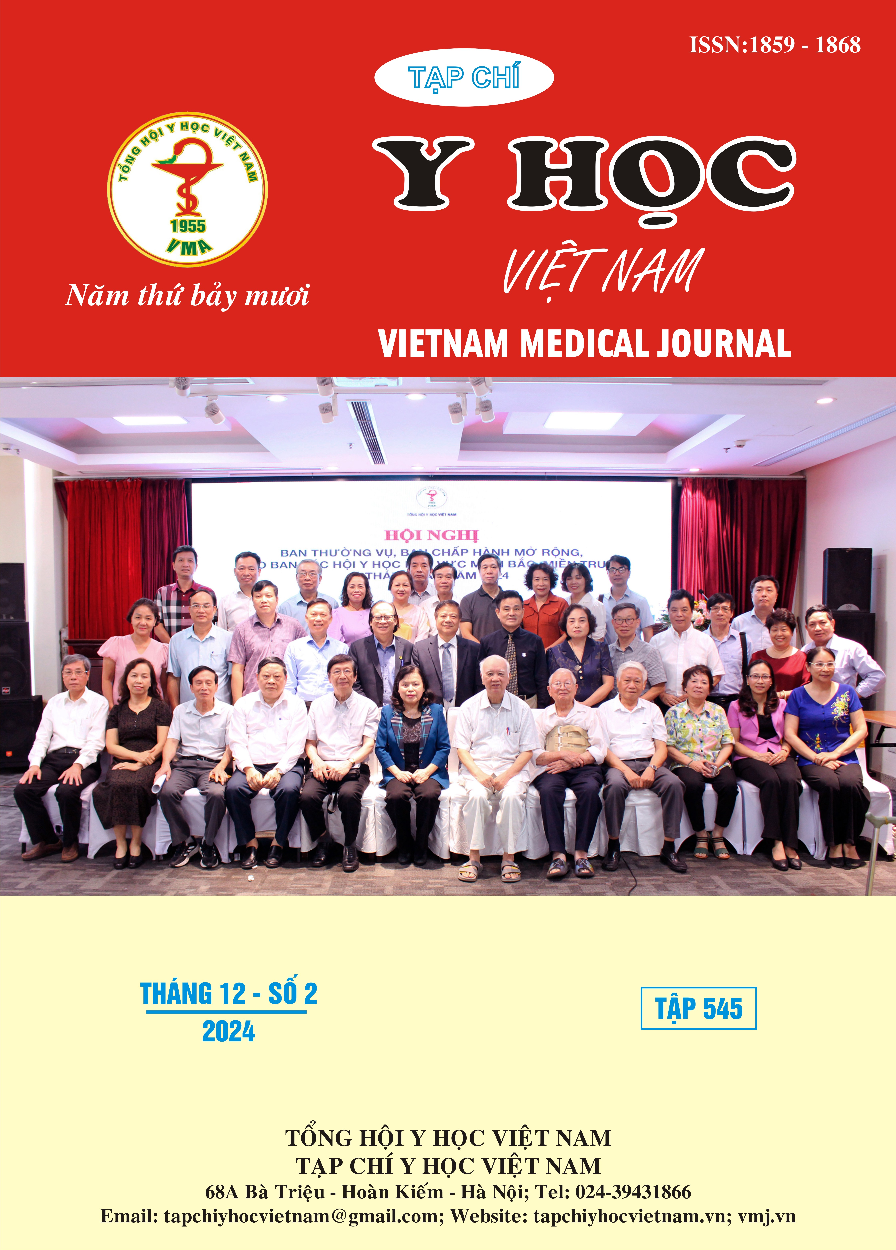DEMENTIA IN CEREBRAL SMALL VASCULAR DISEASE AND SOME RELATED FACTORS
Main Article Content
Abstract
Objective: To investigate some factors related to dementia in small vessel disease of the brain at the Central Geriatric Hospital. Subjects and methods: Cross-sectional descriptive study of 100 patients with small vessel disease of the brain examined and treated at the Central Geriatric Hospital, divided into 2 groups, the group with dementia (30 patients) and the group without dementia (70 patients). Results: In this study, 30% of patients had dementia, 70% of patients did not have dementia; Patients with a high school education or less are 2.7 times more likely to develop dementia than those with a high school education or higher. The difference is statistically significant with p=0.027 (p< 0.05) and OR 95%CI: 2.7(1.1-6.7); Patients with white matter lesions have 5.2 times more dementia than those without lesions. The difference is statistically significant with p=0.001 (p< 0.05) and OR 95%CI: 5.2(1.8-14.6); Patients with a combination of multiple lesions have 5.6 times more dementia than those with single lesions. The difference is statistically significant with p=0.005 (p< 0.05) and OR 95%CI: 5.6(1.7-18.5). Conclusion: In our study, 30% of patients had dementia, 70% of patients did not have dementia. There is a relationship between education level, type of injury and dementia due to cerebral small vessel disease
Article Details
Keywords
Dementia, small vessel disease, cognitive disorders.
References
2. W. H. Organization, "Dementia," September 19, 2019 2024. Accessed: July 14, 2024. [Online]. Available: https://www.who.int/news-room/fact-sheets/detail/dementia.
3. L. Rizzi, I. Rosset, and M. Roriz-Cruz, "Global epidemiology of dementia: Alzheimer's and vascular types," (in eng), Biomed Res Int, vol. 2014, p. 908915, 2014, doi: 10.1155/2014/ 908915.
4. D. DP, G. GT, and K. Z. "More Than Cognition: The Prevalence of Neuropsychiatric Symptoms in Dementia-Related Psychosis." https://morethan cognition.neurologyreviews.com/newsletter/prevalence-neuropsychiatric-symptoms-dementia-related-psychosis/ (accessed 08, 2024).
5. C. S. Ivan et al., "Dementia after stroke: the Framingham Study," (in eng), Stroke, vol. 35, no. 6, pp. 1264-1268, 2004.
6. P. Thắng, Rối loạn nhận thức do mạch máu (Bệnh Alzheimer và các thể sa sút trí tuệ khác). Hà Nội: Nhà xuất bản Y học (in vi), 2010.
7. C. V. Gần and N. T. M. Đức, "Tỷ lệ và một số yếu tố liên quan đến sa sút trí tuệ sau đột quỵ não," (in vi), Tạp chí Y Dược học Cần Thơ, no. 64, pp. 32-38, 2023.
8. H. M. Lợi, N. T. N. Trinh, and P. Hưng, "Nghiên cứu mối liên quan giữa suy giảm nhận thức và sa sút trí tuệ với tổn thương não trên cộng hưởng từ," (in vi), Tạp chí Điện quang & Y học hạt nhân Việt Nam, no. 46, pp. 32-45, 2022.
9. Đ. T. B. Ngọc, N. V. Liệu, and N. K. Việt, "Nghiên cứu đặc điểm lâm sàng của chức năng nhận thức sau nhồi máu não và một số yếu tố liên quan," (in vi), Luận án tiến sỹ y học, Đại học Y Hà Nội, 2018.
10. N. T. Vân, "Nghiên cứu một số đặc điểm rối loạn nhận thức sau nhồi máu não ở bệnh nhân từ 60 tuổi trở lên," Tiến sỹ, Thần Kinh, Đại học Y Hà Nội, Hà Nội, 2009.


